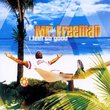| All Artists: Sergey Prokofiev, Sergey Rachmaninov, Kiril Kondrashin, Walter Hendl, Chicago Symphony Orchestra, Symphony of the Air, Van Cliburn Title: Rachmaninoff: Piano concerto No. 3; Prokofiev: Piano Concerto No. 3 [Hybrid SACD] Members Wishing: 3 Total Copies: 0 Label: RCA Original Release Date: 1/1/2005 Re-Release Date: 7/26/2005 Album Type: Hybrid SACD - DSD Genre: Classical Styles: Forms & Genres, Concertos, Historical Periods, Classical (c.1770-1830), Instruments, Keyboard, Symphonies Number of Discs: 1 SwapaCD Credits: 1 UPC: 828766789423 |
Search - Sergey Prokofiev, Sergey Rachmaninov, Kiril Kondrashin :: Rachmaninoff: Piano concerto No. 3; Prokofiev: Piano Concerto No. 3 [Hybrid SACD]
![Rachmaninoff: Piano concerto No. 3; Prokofiev: Piano Concerto No. 3 [Hybrid SACD]](https://nationalbookswap.com/cd//l/41/7741/6127741.jpg) | Sergey Prokofiev, Sergey Rachmaninov, Kiril Kondrashin Rachmaninoff: Piano concerto No. 3; Prokofiev: Piano Concerto No. 3 [Hybrid SACD] Genre: Classical
|
Larger Image |
CD DetailsSimilar CDs
|
CD ReviewsA truly great performance Paul S. | California | 03/10/2006 (5 out of 5 stars) "Rachmaninoff's Third is the ultimate show-off piece for pianists; so Cliburn, like every new kid on the block, had to record it. Instead of the usual dazzling-but-vapid debut performance, though, he turned out one for the ages. Cliburn's basic approach is to play with restraint and poetry most of the time, but pull out all the stops for the big climaxes. This makes those passages all the more climactic, giving the Concerto plenty of "punch" while replacing a lot of tiresome hyperbole with lyric beauty. This approach makes masterful use of the alternate cadenza, played to perfection (well, almost; it's a bit muddy at the end, but that's all!). It's a great performance, but those who merely want to hear someone pounce on the Concerto like a tiger and swallow it whole (as the composer said of Horowitz) will be far happier with Argerich, whose tigress credentials are the stuff of legend. Horowitz himself seems not to have had much "pounce" left in him by the time he and Ormandy made their CD; nonetheless, that one's a "must" for the afficionado because (among other things) it highlights many details of the score glossed over (or even cut) in other performances. The dead, staccato ambiance of the Horowitz CD (don't buy it just because it's digital!) is actually an advantage insofar as nothing much is washed out by reverberation. But musically it doesn't match Cliburn. Nor does Ashkenazy (though he gets better sound). I'm volunteering my comments because nobody else did yet and this is a great performance; I don't have the SACD disc. I'd be amazed if even the revamped sound is top-notch, though, since the previous CD and the LP fell so far short in recording quality. Likewise, since I'm not a Prokofiev fan I won't comment on that piece. The value of the Rachmaninoff performance overrides these concerns." A benchmark recording. A. Rocheleau | Orlando, FL | 03/19/2006 (5 out of 5 stars) "I've owned this recording in various incarnations for 30 years, and it still represents a benchmark performance. Too bad Cliburn burned out so quickly at the keyboard (although he of course still champions young pianists through his Cliburn Competition in Ft. Worth). But fresh from his early Russian triumph, Cliburn and this recording rode a crest of poularity that was at the time very well deserved. As a live document, it is remarkable both for the consistency of the playing, the excitement of the major passages, and the overall sound. I haven't picked up this "hybrid" version yet, although I intend to. Actually, the original CD still sounds fine to me! Having just revisited the recording tonight, I've found that in the process of collecting a dozen different performances of the Rach Third, my tastes may have changed a bit or at least broadened over the years. As good as the Cliburn is, I find that I have come to prefer in their own way the 30's Horowitz version with Coates, as well as the Horowitz/ Reiner from the fifties, and the composer's own reading. I also very much like the versions by Ashkenazy and Tzimon Barto. As a bonus, you have on this disc a rather wild version of Prokofiev Third (I prefer Barto's and the composer's fleeting versions, but this one is still very good). But no matter what direction you go with as a collector of the Rach Third Concerto (and everyone should have several recordings), the Cliburn/Kondrashin really must be one of them." Classic performance, but.... J. Bevan | Mansfield, TX USA | 05/09/2007 (5 out of 5 stars) "I ordered this used through Amazon. It never showed up (and was never charged, either). This, however, is an anomaly in my experience with the Amazon partners used department.
I ordered it for the Rach 3 (as they called it in "Shine"). I learned that piece from this recording when it was released on LP back in 1959 or so. For me it is still the preferred recording. There is a lot of enthusiasm for the Argerich (which I own), but hers is a distorted romp in my opinion. In places it is so fast that Chailly can't keep the orchestra together with her and the ensemble is horrible. Cliburn/Kondrashin is a classy pair. I wanted this version for the quality of the SACD recording. I have had wonderful experience with these SACD reprocessings of the classic Living Stereo recordings. This recording, however, was always a bit of a problem from a technical standpoint because it was recorded live and always seemed muted in the string department. But of the six versions I have owned, this is still the one I prefer. PS: I did not live in Texas at the time and this is not chauvinism for a native son." |

 Track Listings (6) - Disc #1
Track Listings (6) - Disc #1